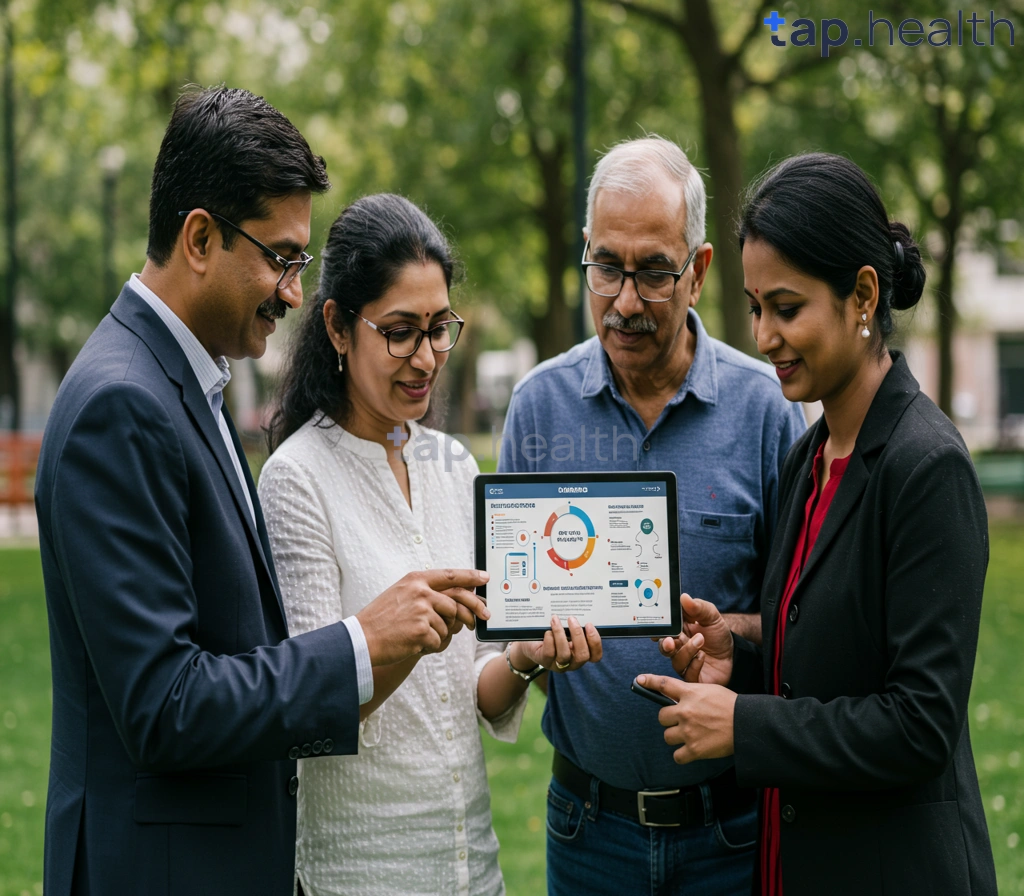Table of Contents
- Diabetes Complications: What’s New in Research?
- Understanding Diabetes: Latest News and Updates
- Preventing Diabetes Complications: A Guide to Better Health
- Diabetes Management: New Treatments and Advances
- Living with Diabetes: The Latest Complications News
- Frequently Asked Questions
- References
Living with diabetes requires constant vigilance, and understanding the potential complications is crucial for effective management. Staying informed about the latest research and advancements is key to proactively protecting your health. That’s why we’ve created this resource dedicated to providing you with the most current information on Diabetes Complications: Latest News and Updates from the Network. We’ll break down complex medical studies into easy-to-understand language, offering insights into prevention strategies and the newest treatment options. Join us as we navigate the landscape of diabetes complications together.
Diabetes Complications: What’s New in Research?
Diabetes, a growing concern globally, significantly impacts populations in India and tropical countries. A substantial portion of those affected, 61% according to the International Diabetes Federation Diabetes Atlas, fall within the 20-64 age group, representing a considerable workforce and economic burden. This highlights the urgent need for improved understanding and management of diabetes complications in these regions.
Emerging Research on Diabetic Neuropathy
Recent studies are focusing on the prevalence and management of diabetic neuropathy, a nerve damage complication particularly prevalent in warmer climates. Research is exploring new therapeutic approaches, including herbal remedies traditionally used in Indian and tropical medicine, alongside advancements in conventional treatments. Early detection and proactive management are crucial to prevent debilitating effects and improve quality of life for affected individuals. Learning how to prevent long-term complications of diabetes is key to a healthier future.
Cardiovascular Disease in Tropical Climates
Cardiovascular disease remains a leading cause of death among individuals with diabetes. Research is increasingly acknowledging the impact of specific environmental factors in tropical regions on cardiovascular complications. Studies are examining the role of humidity, heat stress, and infectious diseases in exacerbating cardiovascular risks in individuals with diabetes. Understanding these regional nuances is critical for developing tailored prevention and treatment strategies. Technological advancements can also play a significant role; discover how new technological advances can improve diabetes lifestyle.
Call to Action: Empowering Communities
For individuals with diabetes in India and tropical countries, proactive healthcare engagement is paramount. Consult your doctor regularly for check-ups and screenings to monitor for complications early on. Stay informed about the latest research and treatment options, and actively participate in community health programs dedicated to diabetes management. Together, we can improve diabetes care in our communities.
Understanding Diabetes: Latest News and Updates
Diabetes is a rapidly growing global health concern, particularly impacting Indian and tropical countries. The International Diabetes Federation projects a staggering increase in the number of people with diabetes, from 536.6 million in 2021 to a projected 783.7 million by 2045. This represents a rise in prevalence from 9.8% to 11.2% within the 20-79 age group. This alarming statistic underscores the urgent need for increased awareness and proactive management strategies in these regions.
Understanding the Regional Challenges
The prevalence of diabetes in India and tropical countries is often exacerbated by several factors, including genetic predisposition, lifestyle changes, and limited access to healthcare. High rates of urbanization, increased consumption of processed foods, and sedentary lifestyles contribute significantly to the rising numbers. Heat and humidity prevalent in tropical climates can also affect blood sugar control and increase the risk of complications. This necessitates tailored approaches to prevention and management, considering the unique socioeconomic and environmental challenges faced by these populations.
Prioritizing Prevention and Management
Effective diabetes management involves a multifaceted approach, focusing on healthy eating habits, regular exercise, and consistent monitoring of blood glucose levels. In tropical regions, access to quality healthcare remains a significant hurdle, making awareness and community-based initiatives crucial. Early diagnosis is vital for preventing or delaying the onset of serious complications, including heart disease, kidney failure, and blindness. Investing in affordable screening programs and accessible healthcare infrastructure is paramount. For practical tips on effective management, check out this helpful guide: 10 Proven Tips to Effectively Manage Diabetes.
Taking Action
The increasing burden of diabetes in Indian and tropical countries requires immediate and concerted action. Individuals must prioritize healthy lifestyles, while healthcare systems need to enhance access to quality care and preventative services. By working together, we can effectively combat this growing health crisis and improve the lives of millions affected by diabetes. Learning how to effectively manage your diabetes can significantly improve your quality of life; for more information, see our article on 10 Proven Tips for Effective Diabetes Management.
Preventing Diabetes Complications: A Guide to Better Health
Diabetes, a growing concern in India and tropical countries, significantly impacts quality of life. However, up to 80% of Type 2 diabetes cases can be delayed or prevented through lifestyle changes, a fact supported by extensive research. This offers a powerful message of hope and control. Taking proactive steps is crucial for managing the risk and preventing serious complications.
Managing Blood Sugar Levels
Maintaining healthy blood sugar levels is paramount. This involves a balanced diet emphasizing whole grains, fruits, vegetables, and lean proteins, limiting refined carbohydrates and sugary drinks prevalent in many Indian and tropical diets. Regular physical activity, even moderate exercise like brisk walking for 30 minutes most days of the week, plays a vital role in improving insulin sensitivity.
Lifestyle Modifications for Prevention
Beyond diet and exercise, managing weight is critical. Obesity significantly increases the risk of developing Type 2 diabetes. Incorporating stress-reducing techniques like yoga or meditation into your daily routine can also contribute to overall well-being and better blood sugar control. These modifications are particularly relevant in high-stress environments common in many tropical regions. As we age, managing diabetes can present new challenges, so it’s important to learn more about Managing Diabetes as You Age: Challenges and Solutions.
Seeking Professional Guidance
Regular check-ups with your doctor are essential for early detection and management. Early intervention can significantly reduce the risk of long-term complications. Don’t hesitate to seek guidance from healthcare professionals on creating a personalized diabetes prevention plan tailored to your individual needs and the specific challenges of your region. Taking control of your health empowers you to live a longer, healthier, and more fulfilling life. Consult your doctor or a qualified healthcare professional to discuss strategies to prevent diabetes complications. Remember that protecting your heart is also crucial, so learn about Protect Your Heart from Diabetes: 5 Essential Steps.
Diabetes Management: New Treatments and Advances
The global burden of diabetes is staggering. The number of people living with this chronic condition has skyrocketed from 200 million in 1990 to a staggering 830 million in 2022, as highlighted by the WHO here. This dramatic increase necessitates a closer look at the latest advancements in diabetes management, particularly relevant to the unique challenges faced in Indian and tropical countries.
Emerging Treatments
Recent years have witnessed significant progress in diabetes treatment. New insulin analogues offer improved efficacy and convenience, while advancements in oral medications provide more targeted approaches to blood sugar control. For instance, GLP-1 receptor agonists and SGLT2 inhibitors are showing promise in not only managing blood glucose levels but also in reducing cardiovascular complications—a crucial aspect given the high prevalence of heart disease in many tropical regions. These newer medications often require less frequent dosing and may have fewer side effects compared to older options.
Technological Advancements
Technological innovation is transforming diabetes care. Continuous glucose monitors (CGMs) provide real-time glucose data, empowering individuals to make informed decisions about their diet and insulin administration. Smart insulin pumps offer automated insulin delivery, minimizing the burden of manual injections. The accessibility and affordability of these technologies remain a key challenge, especially in resource-constrained settings within India and other tropical nations. However, ongoing efforts to improve access are crucial for improving diabetes management outcomes in these regions.
Lifestyle Interventions
While medication plays a vital role, lifestyle modifications remain paramount. In tropical climates, factors like dietary habits and physical activity levels require specific consideration. Promoting culturally appropriate dietary strategies and encouraging regular exercise adapted to the local environment are essential components of effective diabetes management in these regions. Educational initiatives focused on healthy eating and physical activity, tailored to local customs and preferences, can significantly improve patient outcomes. For more information on safe and effective ways to supplement your diet, check out our blog on Safe and Effective Dietary Supplements for Diabetes Care.
Regional Focus and Call to Action
Improved access to affordable medication, advancements in technology, and culturally sensitive lifestyle interventions are vital for effective diabetes management, particularly in India and other tropical countries. Let’s work together to improve access to these resources and empower individuals living with diabetes to live healthier, longer lives. Learn more about local support groups and resources available in your area to better manage your diabetes. Remember that a Personalized Diabetes Control plan can significantly improve your health outcomes.
Living with Diabetes: The Latest Complications News
Diabetes is a global health crisis, claiming a staggering 6.7 million lives in 2021 – that’s one death every five seconds (Source). In India and tropical countries, the prevalence of diabetes and its associated complications is particularly concerning, often exacerbated by factors like limited access to healthcare and lifestyle choices. Understanding the latest news on diabetes complications is crucial for effective management and prevention.
Understanding the Risks
The impact of diabetes extends far beyond high blood sugar. Chronic complications can affect nearly every organ system, including the heart, kidneys, eyes, and nerves. In hotter climates, dehydration and heat-related illnesses further complicate diabetes management. Diabetic neuropathy, for example, is particularly prevalent in these regions, leading to nerve damage that can result in foot ulcers and amputations. Diabetic nephropathy (kidney disease) is another significant concern, often progressing silently until kidney failure occurs. Early detection and proactive management are crucial.
Staying Ahead of Complications
For individuals living with diabetes in India and tropical countries, regular check-ups with healthcare professionals are essential. Maintaining a healthy lifestyle – including a balanced diet, regular exercise, and effective blood sugar monitoring – is paramount. These regions often have unique dietary challenges, so consulting a dietitian who understands local cuisines is highly recommended. Moreover, staying hydrated is exceptionally vital in combating heatstroke and supporting overall health. Planning travel can also present unique challenges; consider reading our tips on Traveling with Diabetes: Essential Tips for a Safe & Healthy Journey before your next trip.
Taking Control
Access to information and support is crucial. This is why staying updated on the latest research and medical advancements in diabetes care is critical. Seek out local diabetes support groups and resources, which can provide invaluable guidance and community support in managing this chronic condition effectively. Your proactive approach is your greatest defense against the long-term complications of diabetes. Understanding the legal and social implications of living with diabetes is also important. For more information, check out our article, Is Diabetes Considered a Disability? Understanding the Implications – Tap Health.
Frequently Asked Questions on Diabetes Complications
Q1. What is the main concern regarding diabetes, especially in tropical countries like India?
Diabetes is a growing global health crisis, significantly impacting the working-age population in tropical countries and placing a large economic burden. A major concern is the high prevalence of complications like diabetic neuropathy, worsened by warm climates, and cardiovascular disease, exacerbated by heat and humidity.
Q2. How can I effectively manage my diabetes and reduce complications?
Effective diabetes management involves a healthy lifestyle with regular exercise, a balanced diet, weight management, and stress reduction. Regular check-ups, utilizing advancements in medication and technology, and participation in community health programs are also crucial. Early detection and consistent monitoring are key to mitigating long-term effects.
Q3. What are the biggest challenges in managing diabetes globally?
Access to quality healthcare remains a significant challenge in many regions, hindering effective diabetes management. This includes access to appropriate medication, technology, and regular check-ups. The economic burden of diabetes also presents a significant obstacle for many individuals and families.
Q4. What role do lifestyle changes play in preventing diabetes complications?
Lifestyle changes are crucial in preventing complications. Focusing on diet, exercise, maintaining a healthy weight, and managing stress can significantly reduce the risk of developing complications. These changes should be made in consultation with healthcare professionals for personalized guidance.
Q5. What types of treatments are available for diabetes and its complications?
Both conventional and traditional treatments are explored for managing diabetes and its complications, particularly diabetic neuropathy. Advancements in medication and technology play a key role in modern treatment approaches, however, access to these resources varies widely across geographical locations and socioeconomic groups.
References
- A Practical Guide to Integrated Type 2 Diabetes Care: https://www.hse.ie/eng/services/list/2/primarycare/east-coast-diabetes-service/management-of-type-2-diabetes/diabetes-and-pregnancy/icgp-guide-to-integrated-type-2.pdf
- What is Diabetes: https://www.medschool.lsuhsc.edu/genetics/docs/DIABETES.pdf



